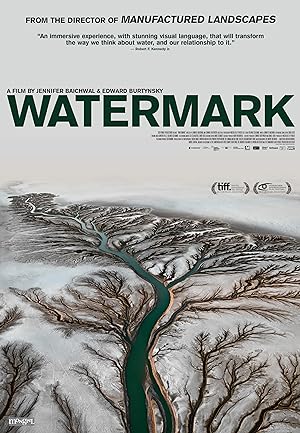Watermark is the kind of documentary that you need to watch in the dark when you’re alert and able to give it your full attention. Because it predominantly consists of images with little dialogue, the documentary expects you to draw your own conclusions from the collection of images on the screen. The overarching theme is the way that water and humans affect and shape each other, and we are shown a broad spectrum from beneficial, peaceful coexistence to beneficial, minor interference, to (hopefully) beneficial, violent interference to harmful, violent interference. Water plays a role in leisure, worship, survival, work, home, community.
What makes Watermark such an arresting visual feast is how it makes us look at images with a fresh perspective. By just showing the image without any explanation or surrounding visual clues in the landscape, using extreme close ups or long shots, then either pulling back or zooming in so we can understand the context of what viewers are seeing, viewers get an idea of what extraterrestrials would think if they saw certain terrestrial landscapes for the first time.
There is an implicit cautionary tale that private interests are using public resources to create private profit while socializing the risk and creating health hazards. Some of those private interests are corporate, but some of it is as ridiculous as people wanting pools in a desert. The results are the same either way-we are using more water than is available and polluting the available water. In particular, the creation of the Xiluoudu Dam illustrates that while man may seem miniscule in comparison to his surroundings, it is laughable to suggest that man cannot create climate change if he can create an artificial bucolic setting.
Watermark shifts between moving pictures and still photographs taken by Edward Burtynsky and tertiarily chronicles his work as he photographs landscapes around the globe, returns to his Toronto studio to develop the film then collaborates with Gerhard Steidl to publish a book with the same title and subject matter as the documentary. If the whole enterprise were not so majestic, it would feel like an infomercial, but if infomercials were more like Burtynsky’s work, the world would be a better place.
If you are open minded and don’t mind a slightly more poetic approach to documentaries, especially if you enjoyed films like More Than Honey, definitely watch Watermark. It is a sumptuous visual feast that is as much a memorial as it is a testament to nature.
Stay In The Know
Join my mailing list to get updates about recent reviews, upcoming speaking engagements, and film news.





